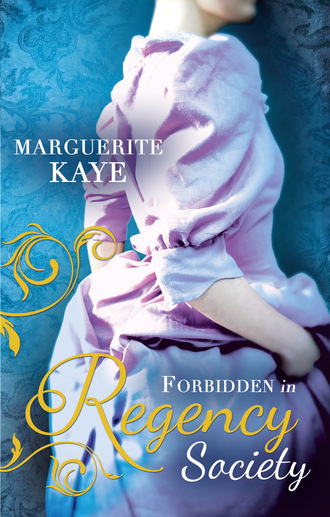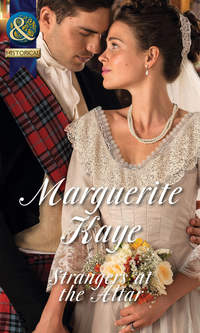
Полная версия
Forbidden in Regency Society


SEDUCTION in Regency Society August 2014
DECEPTION in Regency Society September 2014
PROPOSALS in Regency Society October 2014
PRIDE in Regency Society November 2014
MISCHIEF in Regency Society December 2014
INNOCENCE in Regency Society January 2015
ENCHANTED in Regency Society February 2015
HEIRESS in Regency Society March 2015
PREJUDICE in Regency Society April 2015
FORBIDDEN in Regency Society May 2015
TEMPTATION in Regency Society June 2015
REVENGE in Regency Society July 2015
Born and educated in Scotland, MARGUERITE KAYE originally qualified as a lawyer, but chose not to practise. Instead, she carved out a career in IT and studied history part-time, gaining a first-class honours and a master’s degree. A few decades after winning a children’s national poetry competition, she decided to pursue her lifelong ambition to write and submitted her first historical romance to Mills & Boon. They accepted it and she’s been writing ever since.
You can contact Marguerite through her website at: www.margueritekaye.com.
Forbidden in
Regency
Society
The Governess and the Sheikh
Rake With a Frozen Heart
Marguerite Kaye

MILLS & BOON
Before you start reading, why not sign up?
Thank you for downloading this Mills & Boon book. If you want to hear about exclusive discounts, special offers and competitions, sign up to our email newsletter today!
SIGN ME UP!
Or simply visit
signup.millsandboon.co.uk
Mills & Boon emails are completely free to receive and you can unsubscribe at any time via the link in any email we send you.
Table of Contents
Cover
About the Author
Title Page
The Governess and the Sheikh
Dedication
Chapter One
Chapter Two
Chapter Three
Chapter Four
Chapter Five
Chapter Six
Chapter Seven
Chapter Eight
Chapter Nine
Chapter Ten
Chapter Eleven
Chapter Twelve
Epilogue
Rake with a Frozen Heart
Chapter One
Chapter Two
Chapter Three
Chapter Four
Chapter Five
Chapter Six
Chapter Seven
Chapter Eight
Chapter Nine
Chapter Ten
Chapter Eleven
Chapter Twelve
Epilogue
Copyright
In loving memory of W,
who helped make me the person I am
and whose spirit, hopefully, lives on in me
Chapter One

Daar-el-Abbah, Arabia—1820
Sheikh Jamil al-Nazarri, Prince of Daar-el-Abbah, scrutinised the terms of the complex and detailed proposal laid out before him. A frown of concentration drew his dark brows together, but could not disguise the fact that his face, framed by the formal head dress of finest silk, was an extraordinarily handsome one. The soft golden folds of the cloth perfectly complemented the honeyed tones of his skin. His mouth was set in a firm, determined line, but there was just a hint of a curve at the corners, enough to indicate a sense of humour, even if it was seldom utilised. The sheikh’s nose and jaw were well defined, his flawlessly autocratic profile seemingly perfectly designed for use on the insignia of his kingdom—though Jamil had, in fact, refused to consent to his Council’s request to do so. But it was his eyes that were his most striking feature, for they were the strangest colour, burnished like autumn, with fiery glints and darker depths which seemed to reflect his changing mood. Those eyes transformed Jamil from a striking-looking man into an unforgettable one.
Not that the Prince of Daar-el-Abbah was easily overlooked at the best of times. His position as the most powerful sheikh in the eastern reaches of Arabia saw to that. Jamil had been born to reign and raised to rule. For the last eight years, since he had inherited the throne at the age of twenty-one following the death of his father, he had kept Daar-el-Abbah free from incursion, both maintaining its independence and enhancing its supremacy without the need for any significant bloodshed.
Jamil was a skilled diplomat. He was also a formidable enemy, a fact that significantly enhanced his negotiating position. Though he had not used it in anger for some time, the wicked scimitar with its diamond-and-emerald-encrusted golden hilt that hung at his waist was no mere ceremonial toy.
Still perusing the document in his hand, Jamil got to his feet. Pacing up and down the dais upon which the royal throne sat, his golden cloak, lined with satin and trimmed with passementerie twisted with gold thread and embedded with semi-precious stones, swung out behind him. The contrasting simple white silk of the long tunic he wore underneath revealed a slim figure, athletic and lithe, at the same time both graceful and subtly powerful, reminiscent of the panther, which was his emblem.
‘Is there something wrong, your Highness?’
Halim, Jamil’s trusted aide, spoke tentatively, rousing the prince from his reverie. Alone of the members of the Council of Elders, Halim dared to address Jamil without first asking permission, but he was still wary of doing so, conscious of that fact that, although he had the prince’s confidence, there was no real closeness between them, nor any genuine bond of friendship.
‘No,’ Jamil replied curtly. ‘The betrothal contract seems reasonable enough.’
‘As you can see, all your terms and conditions have been met in full,’ Halim continued carefully. ‘The Princess Adira’s family have been most generous.’
‘With good reason,’ Jamil said pointedly. ‘The advantages this alliance will give them over their neighbours are worth far more than the rights to the few diamond mines I will receive in return.’
‘Indeed, Highness.’ Halim bowed. ‘So, if you are satisfied, perhaps I may suggest we proceed with the signing?’
Jamil threw himself back down on to the throne, in essence a low stool with a scrolled velvet-padded seat. It was made of solid gold, the base perched upon two lions, while the back was in the shape of a sunburst. It was a venerable and venerated relic, proof of the kingdom’s long and illustrious history. More than three hundred years old, it was said that any man who sat upon it who was not a true and destined ruler would fall victim to a curse and die within a year and a day. Jamil’s father had cherished the throne and all it stood for, but Jamil loathed it as ostentatious and impractical—though, as with most things ceremonial, he continued to tolerate it.
He lolled on the unforgiving seat, resting his chin upon his hand, the long index finger of his other hand tapping the document that lay on the low table before him. The various members of his Council of Elders, seated in order of precedence on low stools facing the dais, gazed up at him anxiously.
Jamil sighed inwardly. Sometimes the burden of royalty was wearisome. Though the betrothal contract was important, it was not really uppermost in his mind right now. He recognised that the marriage his Council had for so long entreated him to enter into was a strategic and dynastic necessity, but it was of little personal interest to him. He would marry, and the union would seal the numerous political and commercial agreements that were the foundation of the contract. Daar-el-Abbah would gain a powerful ally and—once Jamil had done his duty—an heir. He personally would gain …
Nothing.
Absolutely nothing.
He had no wish to be married. Not again. Especially not again for the sake of Daar-el-Abbah, this kingdom of his, which owned him body and soul. He didn’t want another wife, and he certainly didn’t want another wife selected by his Council—though, truth be told, one royal princess was bound to be very much like another. He hadn’t disliked his first wife, but poor Karida, who had died in childbirth not long after Jamil came to power, had seemed to prefer the comfits of the liquorice and crystallised ginger she ate with such relish over almost anyone or anything else.
Jamil could happily do without another such, as this Princess Whatever-her-name-was, to whom Halim and his Council were so keen to shackle him, would no doubt turn out to be. He was perfectly content with his single state, but his country needed an heir, therefore he must take a wife, and tradition decreed that the wife should be the choice of the Council. Though he railed against it, it didn’t occur to Jamil to question the process. It was the way of things. Anyway, in principle he was as keen to beget a son as his people were for him to provide them with a crown prince. The problem he was having was in reconciling principle with practice. The fact was, Jamil was not at all sure he was ready for another child. At least not until he had the one he already had under some semblance of control. Which brought him back to the matter uppermost in his mind: his eight-year-old daughter, Linah.
Jamil sighed again, this time out loud. A rustle of unease spread through the assembled Elders in response. Twenty-four of them, excluding Halim, each man wearing the distinctive Council insignia, an al-Nazarri green checked head dress with a golden tie, or igal, to hold it in place, the sign of the panther embroidered on his tunic. Behind the Elders, the throne room stretched for almost a hundred feet, the floor made of polished white marble edged with green-and-gold tiles. Light flooded the chamber from the line of round windows set high into the walls, reflecting through the gold-plated iron grilles, bouncing off the teardrop crystals of the five enormous chandeliers.
Most of the men arrayed before Jamil had served on his father’s Council, too. The majority were traditionalists, resistant to every attempt at change, with whom Jamil found himself becoming increasingly irked. If he could, he would retire the lot of them, but though he was coming to the end of his patience, the prince was not a foolish man. There were many ways to skin a goat. He would take Daar-el-Abbah into the modern world, and he would take his people with him whether they wanted to join him on the journey or not—though he preferred that they came of their own accord, just as he favoured diplomacy over warfare. This marriage now being proposed was his gesture towards appeasement, for the hand that gives is the hand that receives.
He should sign the contract. He had every reason to sign. It made no sense to postpone the inevitable.
So he would sign. Of course he would. Just not yet.
Jamil threw the papers at Halim. ‘It won’t do any harm to make them wait a little longer,’ he said, getting so swiftly to his feet that the Elders were forced to throw themselves hurriedly on to their knees. ‘We don’t want them thinking they are getting too much of a bargain.’ He growled impatiently at his Council. ‘Get up! Get up!’ No matter how many times he said he no longer wished them to show their obeisance in private meetings, they continued to do so. Only Halim stood his ground, following in his wake as Jamil took the two steps down from the dais in one and strode quickly up the long length of the throne room towards the huge double doors at the end.
‘Highness, if I may suggest …?’
‘Not now.’ Jamil threw open the doors, taking the guards on the other side by surprise.
‘But I don’t understand, Highness. I thought we had agreed that—’
‘I said not now!’ Jamil exclaimed. ‘I have another matter I wish to discuss. I’ve had a most interesting letter from Lady Celia.’
Halim hurried to keep pace as they headed along the wide corridor towards the private apartments. ‘Prince Ramiz of A’Qadiz’s English wife? What possible reason can she have for writing to you?’
‘Her letter concerns Linah,’ Jamil replied as they entered the courtyard around which his quarters were built.
‘Indeed? And what precisely does she have to say on the matter?’
‘She writes that she has heard I’m having some difficulty finding a female mentor up to the challenge of responding to my daughter’s quite particular needs. Lady Celia’s father is Lord Armstrong, a senior British diplomat, and she has clearly inherited his subtle way with words. What she really means is that she’s heard Linah is out of control and has run rings around every single woman in whose charge I’ve placed her.’
Halim bristled. ‘I hardly think that your daughter’s behaviour is any business of Lady Celia’s. Nor is it, if I may be so bold, the business of A’Qadiz, or its sheikh.’
‘Prince Ramiz is an upstanding man and an excellent ruler who has forward-thinking views similar to my own. I would suggest, Halim, that any opportunity to bring our two kingdoms closer together is something to be encouraged rather than resented.’
Halim bowed. ‘As ever, you make an excellent point, Highness. That is why you are a royal prince and I a mere servant.’
‘Spare me the false modesty, Halim, we both know you are no mere servant.’
Jamil entered the first of the series of rooms that ran in a square round the courtyard, unfastened his formal cloak and threw it carelessly down on a divan. His head dress and scimitar followed. ‘That’s better,’ he said, running his fingers through his short crop of hair. It was auburn, inherited from his Egyptian mother. Reaching into a drawer of the large ornate desk that dominated the room, he found the letter and scanned it again.
‘May I ask, does Lady Celia offer a solution to our supposed problem?’ Halim asked.
Jamil looked up from the elegantly worded missive and smiled one of his rare smiles, knowing full well that Lady Celia’s proposal would shock his Council and drive a pack of camels through the dictates of convention relating to the upbringing of Arabian princesses. Today’s Council meeting had bored him to tears, and he was sick of tradition. ‘What Lady Celia offers,’ he said, ‘is her sister.’
‘Her sister!’
‘Lady Cassandra Armstrong.’
‘To what purpose, precisely?’
‘To act as Linah’s governess. It is the perfect solution.’
‘Perfect!’ Halim looked appalled. ‘Perfect how? She has no knowledge of our ways—how can you possibly think an English woman capable of training the Princess Linah for her future role?’
‘It is precisely because she will be incapable of such a thing that she is perfect,’ Jamil replied, his smile fading. ‘A dose of English discipline and manners is exactly what Linah needs. Do not forget, the British are one of the world’s great powers, renowned for their capacity for hard work and initiative. Exposure to their culture will challenge my daughter’s cosy view of the world and her place in it. I don’t want her to become some simpering miss who passes the time while I’m finding her a husband by lolling about on divans drinking sherbet and throwing tantrums every time she doesn’t get her own way.’ Like her mother did. He did not say it, but he did not have to. Princess Karida’s tantrums were legendary. ‘I want my daughter to be able to think for herself.’
‘Highness!’ Shock made Halim’s soft brown eyes open wide, giving him the appearance of a startled hare. ‘Princess Linah is Daar-el-Abbah’s biggest asset; why, only the other day the Prince of—’
‘I won’t have my daughter labelled an asset,’ Jamil interrupted fiercely. ‘In the name of the gods, she’s not even nine years old.’
Slightly taken aback at the force of his prince’s response, for though Jamil was a dutiful parent, he was not prone to displays of parental affection, Halim continued with a little more caution. ‘A good marriage takes time to plan, Highness, as you know yourself.’
‘You can forget marrying Linah off, for the present. Until she learns some manners, no sane man would take her on.’ Jamil threw himself on to the tooled leather chair that sat behind the desk. ‘Come on, Halim, you know how appallingly she can behave. I’m at my wits’ end with her. It is partly my own fault, I know, I’ve allowed her to become spoilt since she was deprived of her mother.’
‘But now you are to be married, the Princess Adira will fill that role, surely.’
‘I doubt it. In any case, you’re missing the point. I don’t want Linah to be raised in the traditional ways of an Arabian princess.’ Any more than he would wish his son to be raised in the traditions of an Arabian prince. As he had been. A shadow flitted over Jamil’s countenance as he recalled his father’s harsh methods when it came to child-rearing. No, of a certainty he would not inflict those traditions on his son.
‘You want her to behave like an English lady instead?’ Halim’s anxious face brought him back to the present.
‘Yes. If Lady Celia is an example of an English lady, that is exactly what I want. If this Lady Cassandra is anything like her sister, then she will be perfect.’ Jamil consulted the letter in his hand again. ‘It says here that she’s one-and-twenty. There are three other sisters, much younger, and Lady Cassandra has shared responsibility for their education. Three! If she can manage three girls, then one will be—what is it the English say?—a piece of cake.’
Halim’s face remained resolutely sombre. Jamil laughed. ‘You don’t agree, I take it? You disappoint me. I knew the Council would not immediately perceive the merits in such a proposition, but I thought better of you. Think about it, Halim—the Armstrongs are a family with an excellent pedigree, and, more importantly, impeccable connections. The father is a diplomat with influence in Egypt and India, and the uncle is a member of the English government. It would do us no harm at all to have one of the daughters in our household, and in addition they would be in our debt. According to Lady Celia, we would be doing them a favour.’
‘How so?’
‘Lady Cassandra is already in A’Qadiz and wishes to extend her stay, to see more of our lands, our culture. She is obviously the scholarly type.’
‘One-and-twenty, you say?’ Halim frowned. ‘That is rather old for a female to be unwed, even in England.’
‘Quite. Reading between the lines, I suspect her to be the spinsterish type. You know, the kind of women the English seem to specialise in—plain, more at home with their books than the opposite sex.’ Jamil grinned. ‘Once again, exactly what Linah needs. A dull female with a good education and a strict sense of discipline.’
‘But Highness, you cannot be sure that—’
‘Enough. I will brook no more argument. I’ve tried doing things the traditional way with Linah, and tradition has singularly failed. Now we’ll do it my way, the modern way, and perhaps in doing so my people will see the merits in reaching out beyond the confines of our own culture.’ Jamil got to his feet. ‘I’ve already written to Lady Celia accepting her kind offer. I did not bring you here to discuss the merits of the proposal, merely to implement my decision. We meet at the border of A’Qadiz in three days. Lady Celia will bring her sister, and she will be accompanied by her husband, Prince Ramiz. We will cement our relationship with his kingdom and take delivery of Linah’s new governess at the same time. I’m sure you understand the importance of my caravan being suitably impressive, so please see to it. Now you may go.’
Recognising the note of finality in his master’s voice, Halim had no option but to obey. As the guards closed the doors to the courtyard behind him, he made for his own quarters with a sinking heart. He did not like the sound of this. There was going to be trouble ahead or his name wasn’t Halim Mohammed Zarahh Akbar el-Akkrah.
At that moment in the kingdom of A’Qadiz, in another sunny courtyard in another royal palace, Ladies Celia and Cassandra were taking tea, sitting on mountainous heaps of cushions under the shade of a lemon tree. Beside them, lying contentedly in a basket, Celia’s baby daughter made a snuffling noise, which had the sisters laughing with delight, for surely little Bashirah was the cleverest and most charming child in all of Arabia.
Cassie put her tea glass back on the heavy silver tray beside the samovar. ‘May I hold her?’
‘Of course you may.’ Celia lifted the precious bundle out of the basket and handed her to Cassie, who balanced her niece confidently on her lap, smiling down at her besottedly.
‘Bashirah,’ Cassie said, stroking the baby’s downy cheek with her finger, ‘Such a lovely name. What does it mean?’
‘Bringer of joy.’
Cassie smiled. ‘How apt.’
‘She likes you,’ Celia replied with a tender smile, quite taken by the charming image her sister and her daughter presented. In the weeks since Cassie had arrived in A’Qadiz she seemed to have recovered some of her former sunny disposition, but it saddened Celia to see the stricken look that still made a regular appearance in her sister’s big cornflower-blue eyes on occasions when she thought herself unobserved. The shadows that were testimony to the many sleepless nights since that thing had happened had faded now, and her skin had lost its unnatural pallor. In fact, to everyone else, Cassandra was the radiant beauty she had always been, with her dark golden crown of hair, and her lush curves, so different from Celia’s own slim figure.
But Celia was not everyone else, she was Cassie’s oldest sister, and she loved her dearly. It was a bond forged in adversity, for they had lost their mother when young, and though the gap between Cassie and their next sister, Cressida, was just a little more than three years, it was sufficient to split the family into two distinct camps, the two older ones who struggled to take Mama’s place, and the three younger ones, who needed to be cared for.
‘Poor Cassie,’ Celia said now, leaning over to give her sister a quick hug, ‘you’ve had such a hard time of it these last three months—are you sure you’re ready for this challenge?’
‘Don’t pity me, Celia,’ Cassie replied with a frown. ‘Most of what I’ve been forced to endure has been of my own doing.’
‘How can you say that! He as good as left you at the altar.’
Cassie bit her lip hard. ‘You exaggerate a little. The wedding was still two weeks away.’
‘The betrothal had been formally announced, people were sending gifts—we sent one ourselves—and the guests had been invited to the breakfast. I know you think you loved him, Cassie, but how you can defend him after that …’
‘I’m not defending him.’ Cassie opened her eyes wide to stop the tears from falling. ‘I’m just saying that I’m as much to blame as Augustus.’
‘How so?’ Until now, Cassie had refused to discuss her broken betrothal, for she wanted only to forget it had ever happened, and Celia, who could see that the wound to her sister’s pride was as deep as that to her heart, had tactfully refrained from questioning her. Now, it seemed, her patience was about to pay off, and she could not help but be curious. She leaned over to lift Bashirah from Cassie, for she was making that little impatient noise that preceded an aggressive demand for sustenance. Celia thought of Ramiz and smiled as she settled the baby at her breast. The child had clearly inherited her demanding temperament from her father. ‘Won’t you tell me, Cassie?’ she said gently. ‘Sometimes talking about things, however painful, helps, and I’ve been so worried about you.’









